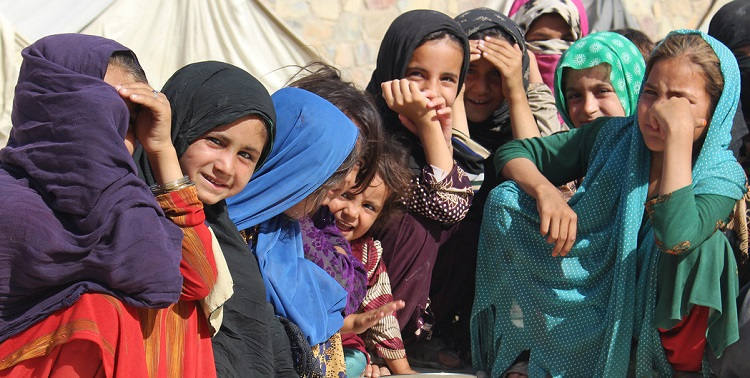The Afghan children are at risk, and everyone knows why. The UNICEF is voicing this and making sure to be vocal about the fact that if nothing is done, then the Afghan children are going to die.
There is at least 1 million Afghan children who are going to suffer from acute and severe malnutrition this year. They could die without getting the proper treatment. This is said by Henrietta Fore, who is also known as the executive director of UNICEF.
“Nearly 10 million girls and boys are right now scared and are depending on the humanitarian assistance just to survive,” Henrietta Fore said at a meeting. This shows that how much serious the fate of these children are.

After the government of Afghanistan collapsed and overnight at that, there had been turmoil in the country ever since. Even if you are not an avid reader of the news, still you might know some of the bits and pieces of info because it is the news that is rocking the world.
Read Also:
- Biden Vows To Hunt Down ISIS-K Leaders
- ‘Another Terror Attack in Kabul is Likely,’ National Security Chiefs Warn Biden
- Supreme Court Conservatives Sound Skeptical About Parts of Texas Abortion Law
This takeover is affecting a lot of people. The children, especially in Afghanistan, along with the women, are at major risk. The help that is being provided might not prove to be enough in the future.
After the takeover, the western government had stopped sending aids to Afghanistan that it has been doing for quite some time now. This has opened up a path for the Taliban to establish a government that can include the individual rights of the people, but we do not know if that is likely to happen.
Groups like UNICEF and other non-government organizations worry about the children, women, and common folks of the country. “Nearly 600,000 people and out of which more than half of whom are children, have been displaced by conflict this year,” Fore said.
This is such a worrying thought and statement in itself. “UNICEF has been on the ground force and had been working in Afghanistan for more than 70 years,” she said, “We know very well what needs to be done for the poor children.”
So that’s that.
UNICEF’s Warning:
The United Nations International Children’s Emergency Fund (UNICEF) plays a vital role in advocating for the rights and well-being of children worldwide.
UNICEF Director Henrietta Fore’s recent warning serves as a wake-up call to the international community about the dire conditions faced by Afghan children.
The Afghan Humanitarian Crisis:
Afghanistan has been mired in a protracted humanitarian crisis due to a combination of factors, including conflict, political instability, economic collapse, and international aid cuts.
Causes of the Crisis:
Several key factors have contributed to the crisis:
a. Political Turmoil: The Taliban’s return to power following the U.S. withdrawal has led to a governance vacuum and political instability.
b. Economic Collapse: Sanctions, frozen assets, and aid cuts have led to an economic meltdown, pushing millions of Afghans into poverty.
c. Food Insecurity: Widespread food shortages, exacerbated by economic turmoil, have left millions without access to adequate nutrition.
Impact on Children:
Children are among the most vulnerable in any crisis, and in Afghanistan, their plight is particularly dire:
a. Malnutrition: Many children are suffering from severe acute malnutrition, a condition that can be life-threatening if not addressed promptly.
b. Lack of Healthcare: Access to healthcare services is limited, putting children’s lives at risk from preventable diseases and illnesses.
c. Education Disruption: Ongoing conflict and insecurity have disrupted education, depriving children of their right to learn and potentially perpetuating a cycle of poverty.
d. Child Labor: Desperation has led to an increase in child labor as families struggle to survive.
International Response:
The international community plays a crucial role in addressing this humanitarian catastrophe:
a. Humanitarian Aid: Increased humanitarian aid is urgently needed to provide food, healthcare, clean water, and shelter to vulnerable Afghan children and families.
b. Diplomatic Efforts: Diplomatic initiatives are vital to ensure access for humanitarian organizations, protect human rights, and facilitate safe passage for aid workers.
c. Refugee Support: Countries must collaborate to provide refuge to Afghan refugees fleeing the crisis.
d. Advocacy: Advocacy and awareness campaigns are essential to mobilize resources and public support for the plight of Afghan children.
Challenges and Obstacles:
Addressing the crisis is not without its challenges:
a. Geopolitical Complexities: Afghanistan’s complex geopolitical landscape complicates humanitarian efforts.
b. Security Concerns: Security risks hinder the delivery of aid to affected areas.
Long-Term Solutions:
Beyond immediate relief, long-term solutions are essential:
a. Rebuilding Infrastructure: Investment in infrastructure is crucial to reestablish basic services.
b. Education Revival: Access to quality education must be restored to secure a better future for Afghan children.
c. Economic Recovery: Efforts to rebuild the economy and create jobs are vital to reduce poverty and dependence on aid.
Read Also:
- Political Crisis in Italy?
- India Slams UK’s New Travel Rules
- Britain Faces Gas Crisis, Labour Shortage and Supply Chain Chaos
Conclusion:
The warning from UNICEF Director Henrietta Fore about one million Afghan children at risk of starvation is a distressing reminder of the ongoing humanitarian crisis in Afghanistan.
The suffering endured by these children demands an immediate and robust international response. It is imperative that the global community acts swiftly to provide essential humanitarian aid, protect children’s rights, and work toward lasting stability in Afghanistan.
The lives and future of countless Afghan children hang in the balance, underscoring the moral obligation to provide assistance and support to those in need.



















